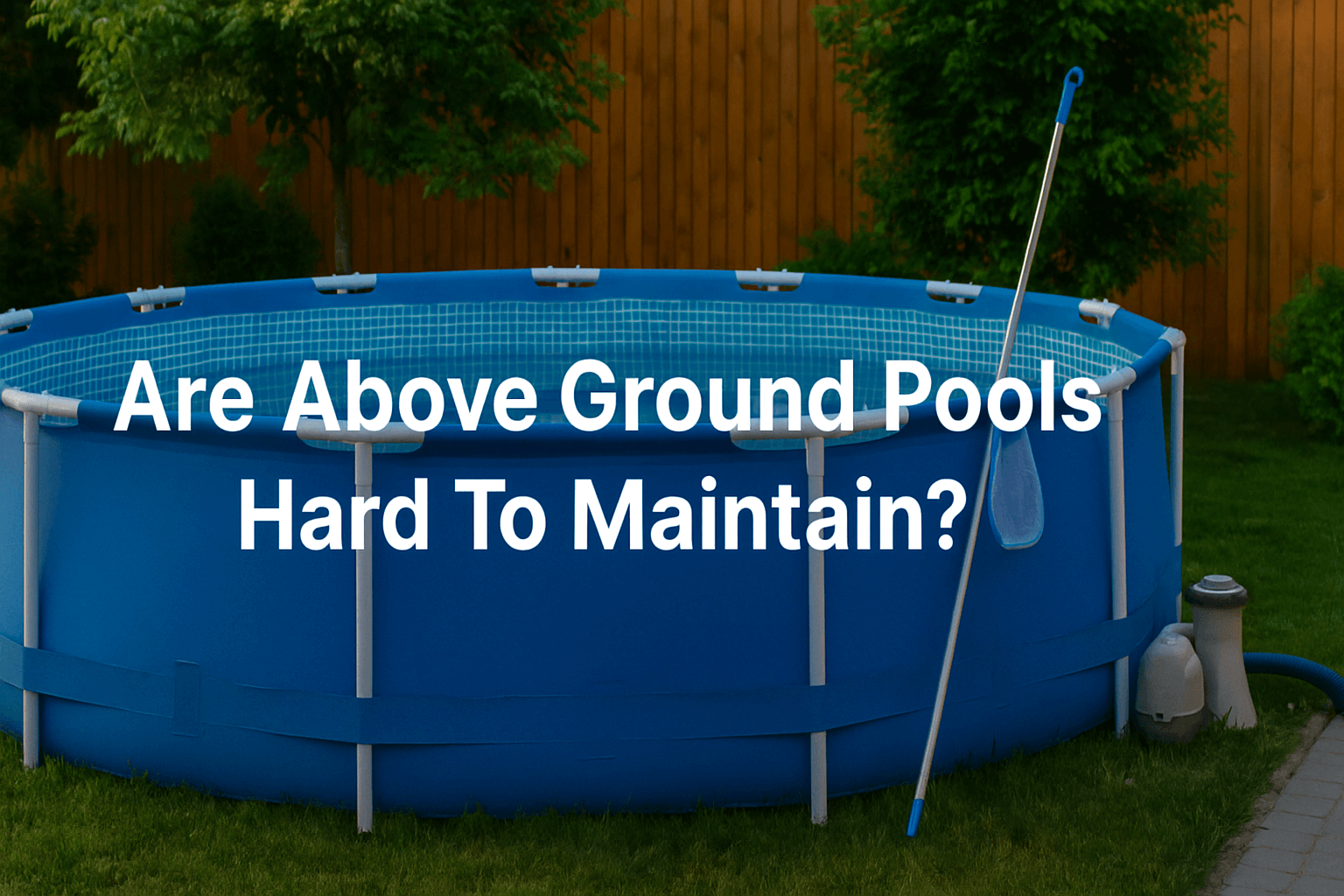
Are Above Ground Pools Hard To Maintain?
Thinking of getting a collapsible swimming pool but worried it’s a hassle? Short answer: it’s easier than you think! With a bit of routine, the right kit, and a few clever tips, maintenance is a breeze. Keep reading—we’ll spill the (chlorinated) secrets to stress-free pool care.
Understanding Above Ground Pool Maintenance
Owning an above ground pool sounds like all fun and games... until someone mentions maintenance. But here’s the thing: once you know what you're doing, it's not that bad. Think of it like brushing your teeth—a bit of effort now saves a world of trouble later.
Core Maintenance Tasks
Water Chemistry Balancing (pH, chlorine, alkalinity)
Water chemistry might sound like a GCSE science lesson, but it’s not rocket science. You just need to check a few levels regularly:
-
pH should stay between 7.2 and 7.8
-
Chlorine keeps the pool safe and clean
-
Alkalinity and calcium hardness help prevent corrosion and scale
Test the water at least twice a week in summer. With a simple test kit, it takes just a few minutes—and it stops itchy eyes and dodgy smells.
Filtration and Circulation (pump, filter cleaning)
Your pool’s filter is like its lungs—it keeps everything flowing and clean. Run the filtration system for around 8 hours a day during peak season. Clean or change the filter according to the manual (or when it looks like it’s grown its own eco-system).
If you're constantly battling murky water, your filter might be underperforming. Upgrading to a more efficient model can save you time and stress in the long run.
Cleaning (skimming, vacuuming, brushing)
Leaves, bugs, grass clippings... they all end up in your pool. Skim the surface daily and give it a vacuum once or twice a week.
Brushing the pool walls helps stop algae setting up camp. A 15-minute clean a few times a week goes a long way.

Time and Effort Commitment
Daily, Weekly, and Monthly Routines
You don’t need to live poolside with a clipboard, but a bit of routine makes all the difference. Daily tasks are light—a quick skim and visual check.
Weekly, test the water and give it a proper clean. Monthly, inspect the equipment and top up any chemicals.
Set a timer for the pump. Keep a note of what you’ve done—a pool diary helps spot patterns before they become problems.
Seasonal Maintenance (opening, closing, winterisation)
UK weather loves to surprise us, so your pool routine needs to flex with the seasons.
Spring: Give everything a once-over after winter. Check the liner, hoses, pump, and filter.
Summer: Check water chemistry more often and keep debris in check.
Autumn: Clean thoroughly and cover it up before the leaves fall.
Winter: Drain the water to below the skimmer, and protect your pump and filter from frost.

Factors Influencing Maintenance Difficulty
Pool Size and Type
Smaller Pools vs. Larger Pools
Bigger pools mean more water, more chemicals, and more cleaning. But they also stay more stable—the water chemistry doesn’t swing as wildly.
Small pools are quicker to clean but need faster responses if something goes wrong.
Inflatable vs. Hard-Sided Pools
Inflatables are quick and cheap, but they often lack proper filtration. That means you’re the filter. You’ll need to change water often and scrub more.
Hard-sided pools come with sturdier gear, better filtration, and longer lifespans. They’re more work to set up but much easier to live with.
Equipment Quality and Automation
Advanced Filtration Systems
Good filtration is your best friend. A powerful pump and quality filter cut your cleaning time dramatically.
They help prevent murky water and cut down on algae outbreaks. Look for models with easy-clean cartridges or backwash options.
Robotic Cleaners and Chemical Dispensers
Robotic vacuums feel like cheating—and we’re all for it. These little machines quietly clean your pool while you have a cuppa.
Automatic chlorine dispensers keep your levels steady without constant testing. Together, they make pool care nearly hands-off.
Environmental Factors
Debris from Trees and Surrounding Landscape
Got trees nearby? Expect to skim. A lot.
Leaves, seeds, and bugs are regular guests. Consider using a pool cover when it’s not in use, and trim overhanging branches if you can.
Algae Growth from Sunlight and Warmth
Warm weather and still water? That’s an open invite for algae.
Keep chlorine levels steady and water moving. A shady spot helps, but good circulation is your best defence.

Are Above Ground Pools Easier to Maintain?
Top Tips and Proactive Measures
Proper Installation and Ground Preparation
Level ground matters—trust us. A wonky base puts stress on the pool and can lead to leaks or damage.
Use a proper base like compacted sand or foam tiles. It makes a huge difference long term.
Using Pool Covers (solar, winter)
A decent cover keeps out debris, slows evaporation, and helps keep the water warm.
Solar covers are great in summer, and winter covers protect during the colder months. Bonus: fewer spiders in the pool.
Good Landscaping to Minimise Debris
Gravel or paving around the pool beats grass hands down. No mowing, no mud, no clippings.
Keep trees trimmed and consider windbreaks like fencing or hedging. The fewer leaves nearby, the less cleaning you’ll do.
Smart Tools and Products
Test Kits and Automated Feeders
Test strips or digital testers make checking water a breeze. Pair that with an automatic feeder and you’ll barely lift a finger.
It’s all about working smarter, not harder.
Efficient Pumps and Filters
Don’t cheap out on these—they do the heavy lifting. A quiet, powerful pump and a decent filter save hours of faff.
Look for energy-efficient models to keep your bills down too.
Learning and Consistency
Understanding Pool Chemistry Basics
You don’t need to memorise the periodic table. Just learn the basics: pH, chlorine, and alkalinity.
Once you’ve got the hang of it, the rest is second nature.
Sticking to a Regular Maintenance Schedule
Set reminders on your phone, make a chart, or leave sticky notes by the kettle.
Whatever helps you stick to the plan. A little often is better than a panic clean once a month.
With the right tools, a bit of know-how, and a splash of consistency, above ground pool maintenance is totally doable. No pool boy required.
Now, get the kettle on—you’ve got a clean pool to enjoy.
Have you checked out our other posts?
Are Above Ground Pools Dangerous?
Do Above Ground Pools Break Easily?
What Are The Risks Of Above Ground Pools?
How To Keep An Above Ground Pool From Collapsing?
What Not To Do With An Above Ground Pool?


Leave a comment